An Examination of Human Rights Violations by the Nigerian Police Force
VerifiedAdded on 2021/12/20
|9
|2632
|30
Essay
AI Summary
This essay provides a comprehensive analysis of human rights violations committed by the Nigerian Police Force (NPF). It examines the historical context, tracing the NPF's origins from British colonial rule to its current structure, and highlights the persistent issues of extrajudicial killings, brutality, corruption, and lack of accountability. The essay contrasts the Nigerian policing system with the U.S. model, discussing internal, state, and social control mechanisms. It explores how political factors, including military rule and subsequent democratic transitions, have influenced the NPF's operations and accountability. The essay emphasizes the impact of these violations on citizens' trust and the principles of democratic policing, concluding with the need for urgent reforms to ensure fairness, transparency, and respect for human rights within the NPF. The essay references several scholarly sources to support its arguments, providing a detailed overview of the challenges and potential solutions related to policing and human rights in Nigeria.
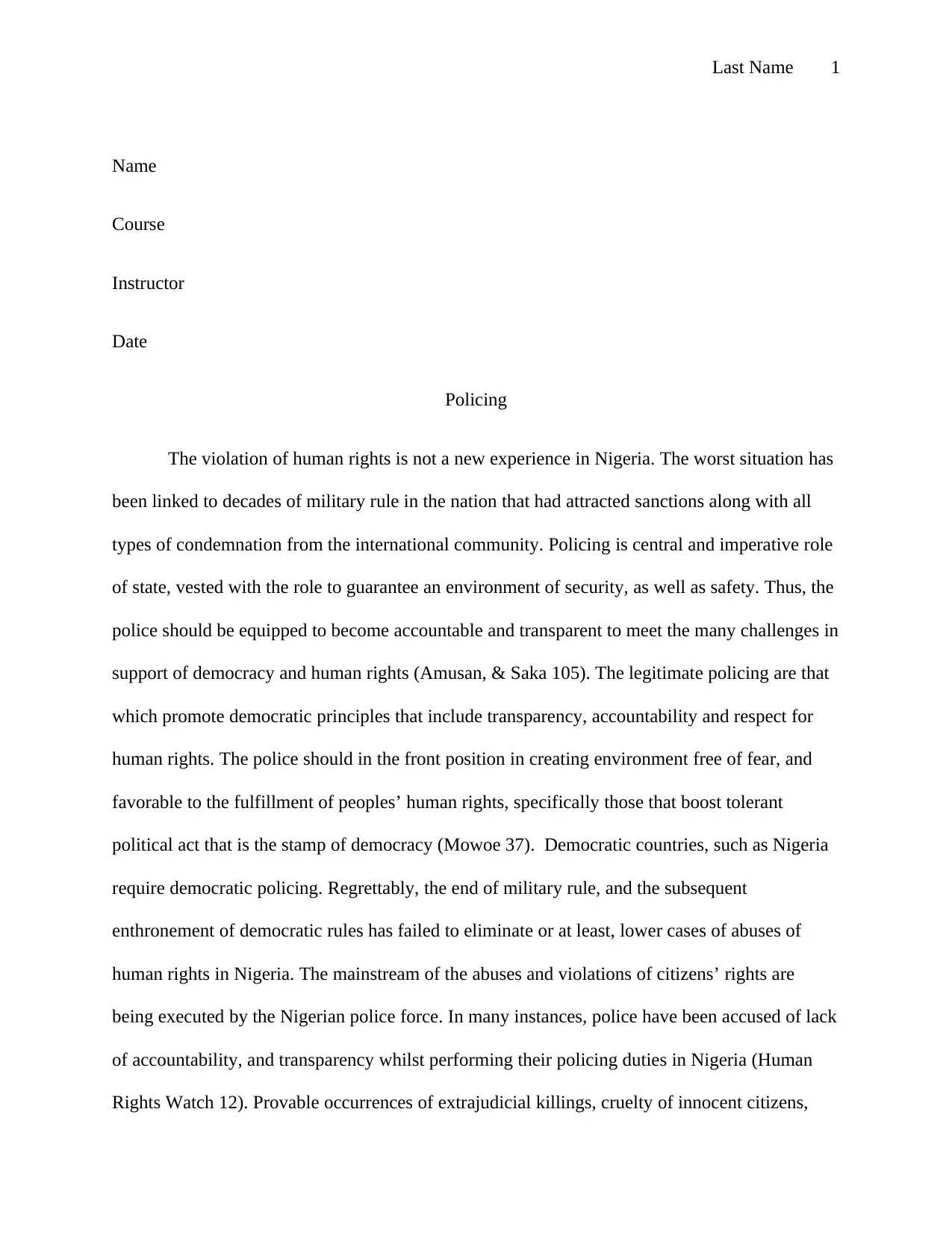
Last Name 1
Name
Course
Instructor
Date
Policing
The violation of human rights is not a new experience in Nigeria. The worst situation has
been linked to decades of military rule in the nation that had attracted sanctions along with all
types of condemnation from the international community. Policing is central and imperative role
of state, vested with the role to guarantee an environment of security, as well as safety. Thus, the
police should be equipped to become accountable and transparent to meet the many challenges in
support of democracy and human rights (Amusan, & Saka 105). The legitimate policing are that
which promote democratic principles that include transparency, accountability and respect for
human rights. The police should in the front position in creating environment free of fear, and
favorable to the fulfillment of peoples’ human rights, specifically those that boost tolerant
political act that is the stamp of democracy (Mowoe 37). Democratic countries, such as Nigeria
require democratic policing. Regrettably, the end of military rule, and the subsequent
enthronement of democratic rules has failed to eliminate or at least, lower cases of abuses of
human rights in Nigeria. The mainstream of the abuses and violations of citizens’ rights are
being executed by the Nigerian police force. In many instances, police have been accused of lack
of accountability, and transparency whilst performing their policing duties in Nigeria (Human
Rights Watch 12). Provable occurrences of extrajudicial killings, cruelty of innocent citizens,
Name
Course
Instructor
Date
Policing
The violation of human rights is not a new experience in Nigeria. The worst situation has
been linked to decades of military rule in the nation that had attracted sanctions along with all
types of condemnation from the international community. Policing is central and imperative role
of state, vested with the role to guarantee an environment of security, as well as safety. Thus, the
police should be equipped to become accountable and transparent to meet the many challenges in
support of democracy and human rights (Amusan, & Saka 105). The legitimate policing are that
which promote democratic principles that include transparency, accountability and respect for
human rights. The police should in the front position in creating environment free of fear, and
favorable to the fulfillment of peoples’ human rights, specifically those that boost tolerant
political act that is the stamp of democracy (Mowoe 37). Democratic countries, such as Nigeria
require democratic policing. Regrettably, the end of military rule, and the subsequent
enthronement of democratic rules has failed to eliminate or at least, lower cases of abuses of
human rights in Nigeria. The mainstream of the abuses and violations of citizens’ rights are
being executed by the Nigerian police force. In many instances, police have been accused of lack
of accountability, and transparency whilst performing their policing duties in Nigeria (Human
Rights Watch 12). Provable occurrences of extrajudicial killings, cruelty of innocent citizens,
Paraphrase This Document
Need a fresh take? Get an instant paraphrase of this document with our AI Paraphraser
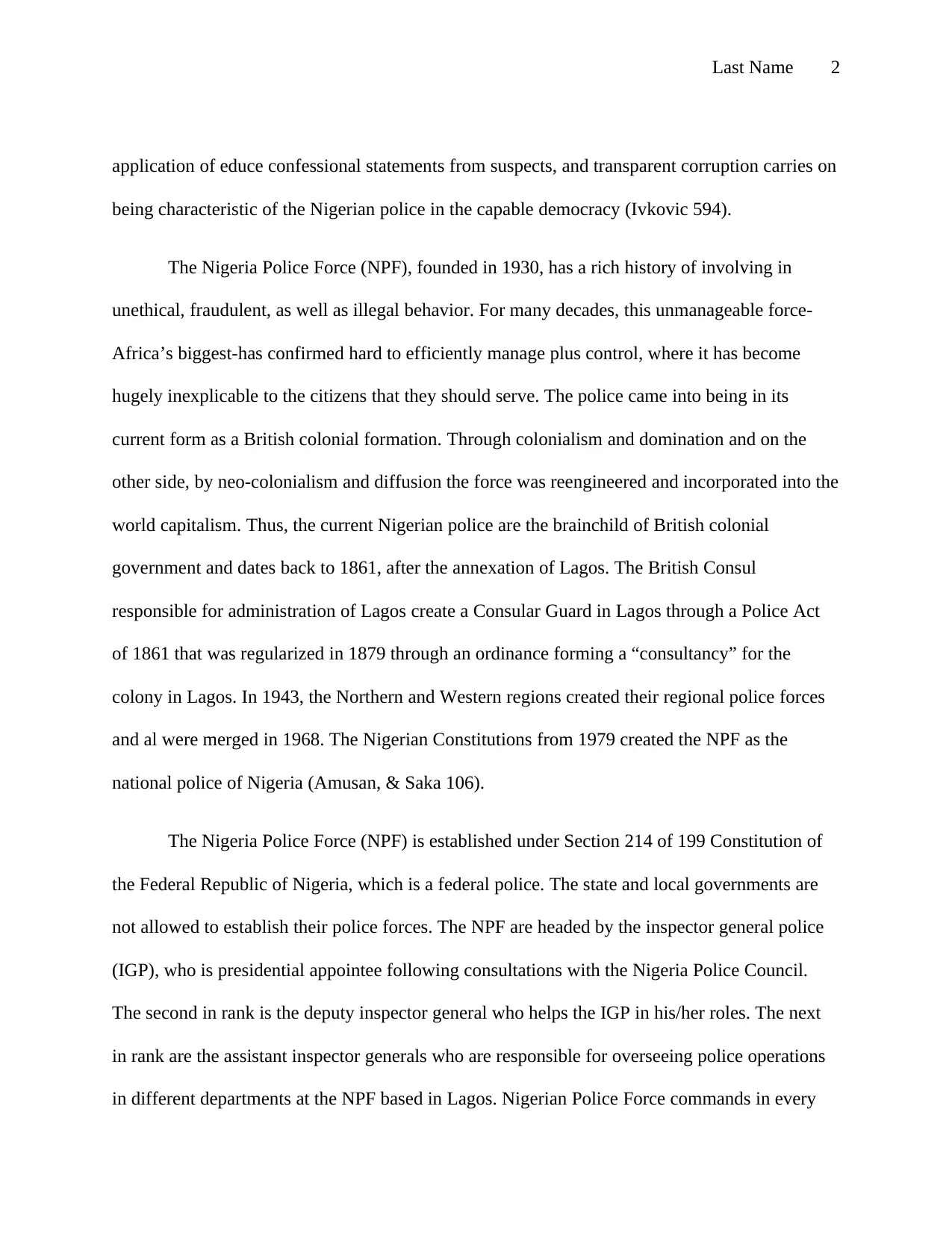
Last Name 2
application of educe confessional statements from suspects, and transparent corruption carries on
being characteristic of the Nigerian police in the capable democracy (Ivkovic 594).
The Nigeria Police Force (NPF), founded in 1930, has a rich history of involving in
unethical, fraudulent, as well as illegal behavior. For many decades, this unmanageable force-
Africa’s biggest-has confirmed hard to efficiently manage plus control, where it has become
hugely inexplicable to the citizens that they should serve. The police came into being in its
current form as a British colonial formation. Through colonialism and domination and on the
other side, by neo-colonialism and diffusion the force was reengineered and incorporated into the
world capitalism. Thus, the current Nigerian police are the brainchild of British colonial
government and dates back to 1861, after the annexation of Lagos. The British Consul
responsible for administration of Lagos create a Consular Guard in Lagos through a Police Act
of 1861 that was regularized in 1879 through an ordinance forming a “consultancy” for the
colony in Lagos. In 1943, the Northern and Western regions created their regional police forces
and al were merged in 1968. The Nigerian Constitutions from 1979 created the NPF as the
national police of Nigeria (Amusan, & Saka 106).
The Nigeria Police Force (NPF) is established under Section 214 of 199 Constitution of
the Federal Republic of Nigeria, which is a federal police. The state and local governments are
not allowed to establish their police forces. The NPF are headed by the inspector general police
(IGP), who is presidential appointee following consultations with the Nigeria Police Council.
The second in rank is the deputy inspector general who helps the IGP in his/her roles. The next
in rank are the assistant inspector generals who are responsible for overseeing police operations
in different departments at the NPF based in Lagos. Nigerian Police Force commands in every
application of educe confessional statements from suspects, and transparent corruption carries on
being characteristic of the Nigerian police in the capable democracy (Ivkovic 594).
The Nigeria Police Force (NPF), founded in 1930, has a rich history of involving in
unethical, fraudulent, as well as illegal behavior. For many decades, this unmanageable force-
Africa’s biggest-has confirmed hard to efficiently manage plus control, where it has become
hugely inexplicable to the citizens that they should serve. The police came into being in its
current form as a British colonial formation. Through colonialism and domination and on the
other side, by neo-colonialism and diffusion the force was reengineered and incorporated into the
world capitalism. Thus, the current Nigerian police are the brainchild of British colonial
government and dates back to 1861, after the annexation of Lagos. The British Consul
responsible for administration of Lagos create a Consular Guard in Lagos through a Police Act
of 1861 that was regularized in 1879 through an ordinance forming a “consultancy” for the
colony in Lagos. In 1943, the Northern and Western regions created their regional police forces
and al were merged in 1968. The Nigerian Constitutions from 1979 created the NPF as the
national police of Nigeria (Amusan, & Saka 106).
The Nigeria Police Force (NPF) is established under Section 214 of 199 Constitution of
the Federal Republic of Nigeria, which is a federal police. The state and local governments are
not allowed to establish their police forces. The NPF are headed by the inspector general police
(IGP), who is presidential appointee following consultations with the Nigeria Police Council.
The second in rank is the deputy inspector general who helps the IGP in his/her roles. The next
in rank are the assistant inspector generals who are responsible for overseeing police operations
in different departments at the NPF based in Lagos. Nigerian Police Force commands in every
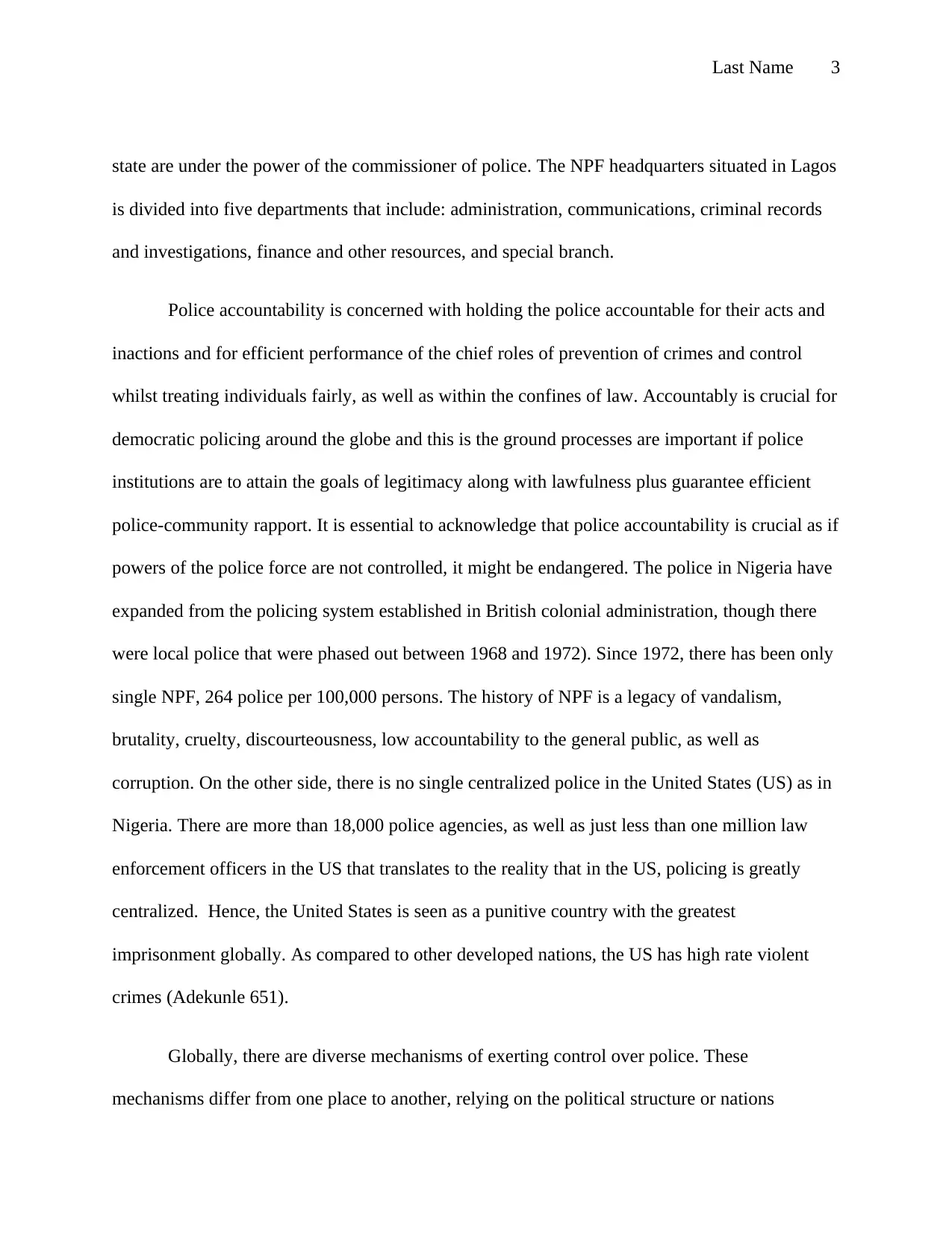
Last Name 3
state are under the power of the commissioner of police. The NPF headquarters situated in Lagos
is divided into five departments that include: administration, communications, criminal records
and investigations, finance and other resources, and special branch.
Police accountability is concerned with holding the police accountable for their acts and
inactions and for efficient performance of the chief roles of prevention of crimes and control
whilst treating individuals fairly, as well as within the confines of law. Accountably is crucial for
democratic policing around the globe and this is the ground processes are important if police
institutions are to attain the goals of legitimacy along with lawfulness plus guarantee efficient
police-community rapport. It is essential to acknowledge that police accountability is crucial as if
powers of the police force are not controlled, it might be endangered. The police in Nigeria have
expanded from the policing system established in British colonial administration, though there
were local police that were phased out between 1968 and 1972). Since 1972, there has been only
single NPF, 264 police per 100,000 persons. The history of NPF is a legacy of vandalism,
brutality, cruelty, discourteousness, low accountability to the general public, as well as
corruption. On the other side, there is no single centralized police in the United States (US) as in
Nigeria. There are more than 18,000 police agencies, as well as just less than one million law
enforcement officers in the US that translates to the reality that in the US, policing is greatly
centralized. Hence, the United States is seen as a punitive country with the greatest
imprisonment globally. As compared to other developed nations, the US has high rate violent
crimes (Adekunle 651).
Globally, there are diverse mechanisms of exerting control over police. These
mechanisms differ from one place to another, relying on the political structure or nations
state are under the power of the commissioner of police. The NPF headquarters situated in Lagos
is divided into five departments that include: administration, communications, criminal records
and investigations, finance and other resources, and special branch.
Police accountability is concerned with holding the police accountable for their acts and
inactions and for efficient performance of the chief roles of prevention of crimes and control
whilst treating individuals fairly, as well as within the confines of law. Accountably is crucial for
democratic policing around the globe and this is the ground processes are important if police
institutions are to attain the goals of legitimacy along with lawfulness plus guarantee efficient
police-community rapport. It is essential to acknowledge that police accountability is crucial as if
powers of the police force are not controlled, it might be endangered. The police in Nigeria have
expanded from the policing system established in British colonial administration, though there
were local police that were phased out between 1968 and 1972). Since 1972, there has been only
single NPF, 264 police per 100,000 persons. The history of NPF is a legacy of vandalism,
brutality, cruelty, discourteousness, low accountability to the general public, as well as
corruption. On the other side, there is no single centralized police in the United States (US) as in
Nigeria. There are more than 18,000 police agencies, as well as just less than one million law
enforcement officers in the US that translates to the reality that in the US, policing is greatly
centralized. Hence, the United States is seen as a punitive country with the greatest
imprisonment globally. As compared to other developed nations, the US has high rate violent
crimes (Adekunle 651).
Globally, there are diverse mechanisms of exerting control over police. These
mechanisms differ from one place to another, relying on the political structure or nations
⊘ This is a preview!⊘
Do you want full access?
Subscribe today to unlock all pages.

Trusted by 1+ million students worldwide
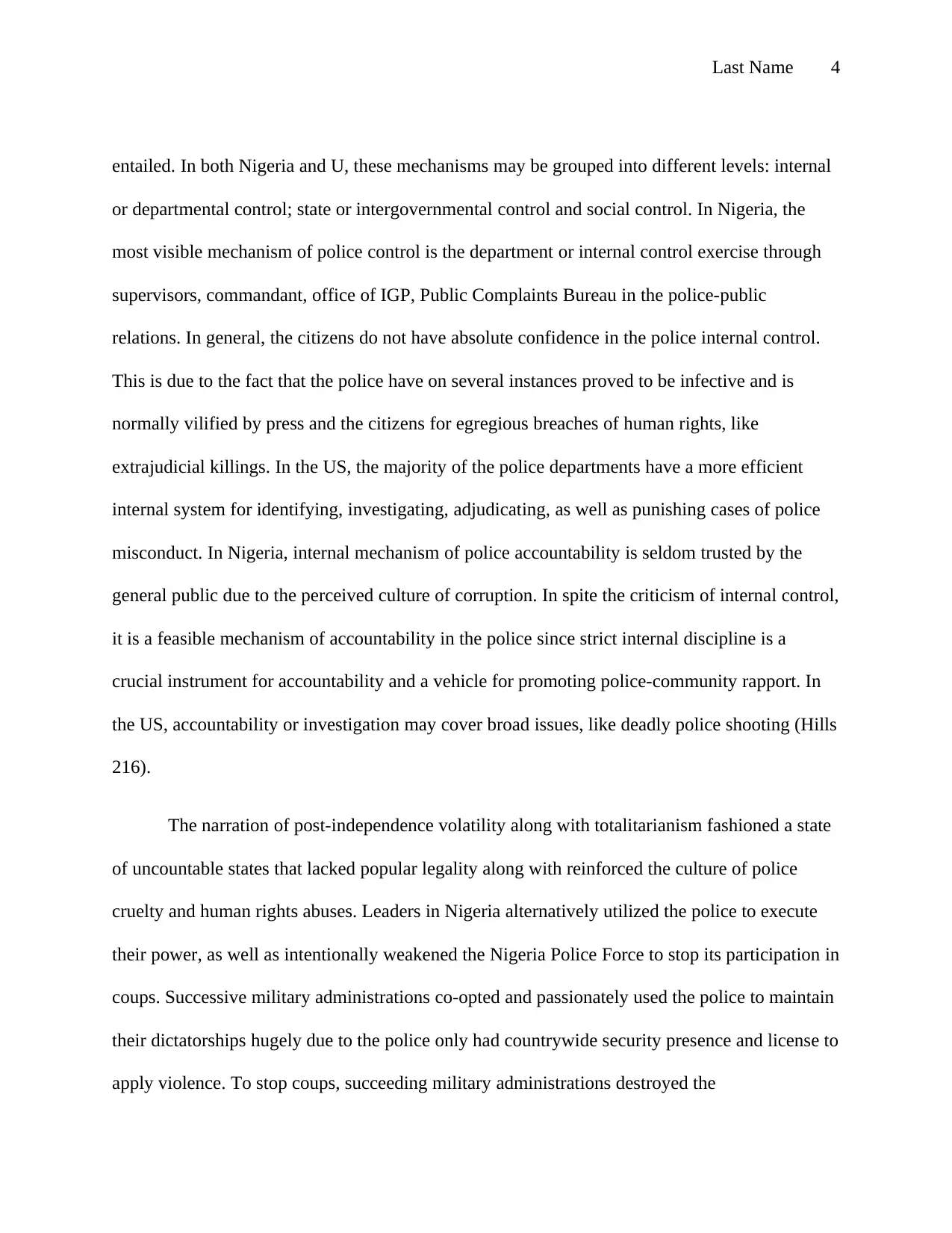
Last Name 4
entailed. In both Nigeria and U, these mechanisms may be grouped into different levels: internal
or departmental control; state or intergovernmental control and social control. In Nigeria, the
most visible mechanism of police control is the department or internal control exercise through
supervisors, commandant, office of IGP, Public Complaints Bureau in the police-public
relations. In general, the citizens do not have absolute confidence in the police internal control.
This is due to the fact that the police have on several instances proved to be infective and is
normally vilified by press and the citizens for egregious breaches of human rights, like
extrajudicial killings. In the US, the majority of the police departments have a more efficient
internal system for identifying, investigating, adjudicating, as well as punishing cases of police
misconduct. In Nigeria, internal mechanism of police accountability is seldom trusted by the
general public due to the perceived culture of corruption. In spite the criticism of internal control,
it is a feasible mechanism of accountability in the police since strict internal discipline is a
crucial instrument for accountability and a vehicle for promoting police-community rapport. In
the US, accountability or investigation may cover broad issues, like deadly police shooting (Hills
216).
The narration of post-independence volatility along with totalitarianism fashioned a state
of uncountable states that lacked popular legality along with reinforced the culture of police
cruelty and human rights abuses. Leaders in Nigeria alternatively utilized the police to execute
their power, as well as intentionally weakened the Nigeria Police Force to stop its participation in
coups. Successive military administrations co-opted and passionately used the police to maintain
their dictatorships hugely due to the police only had countrywide security presence and license to
apply violence. To stop coups, succeeding military administrations destroyed the
entailed. In both Nigeria and U, these mechanisms may be grouped into different levels: internal
or departmental control; state or intergovernmental control and social control. In Nigeria, the
most visible mechanism of police control is the department or internal control exercise through
supervisors, commandant, office of IGP, Public Complaints Bureau in the police-public
relations. In general, the citizens do not have absolute confidence in the police internal control.
This is due to the fact that the police have on several instances proved to be infective and is
normally vilified by press and the citizens for egregious breaches of human rights, like
extrajudicial killings. In the US, the majority of the police departments have a more efficient
internal system for identifying, investigating, adjudicating, as well as punishing cases of police
misconduct. In Nigeria, internal mechanism of police accountability is seldom trusted by the
general public due to the perceived culture of corruption. In spite the criticism of internal control,
it is a feasible mechanism of accountability in the police since strict internal discipline is a
crucial instrument for accountability and a vehicle for promoting police-community rapport. In
the US, accountability or investigation may cover broad issues, like deadly police shooting (Hills
216).
The narration of post-independence volatility along with totalitarianism fashioned a state
of uncountable states that lacked popular legality along with reinforced the culture of police
cruelty and human rights abuses. Leaders in Nigeria alternatively utilized the police to execute
their power, as well as intentionally weakened the Nigeria Police Force to stop its participation in
coups. Successive military administrations co-opted and passionately used the police to maintain
their dictatorships hugely due to the police only had countrywide security presence and license to
apply violence. To stop coups, succeeding military administrations destroyed the
Paraphrase This Document
Need a fresh take? Get an instant paraphrase of this document with our AI Paraphraser
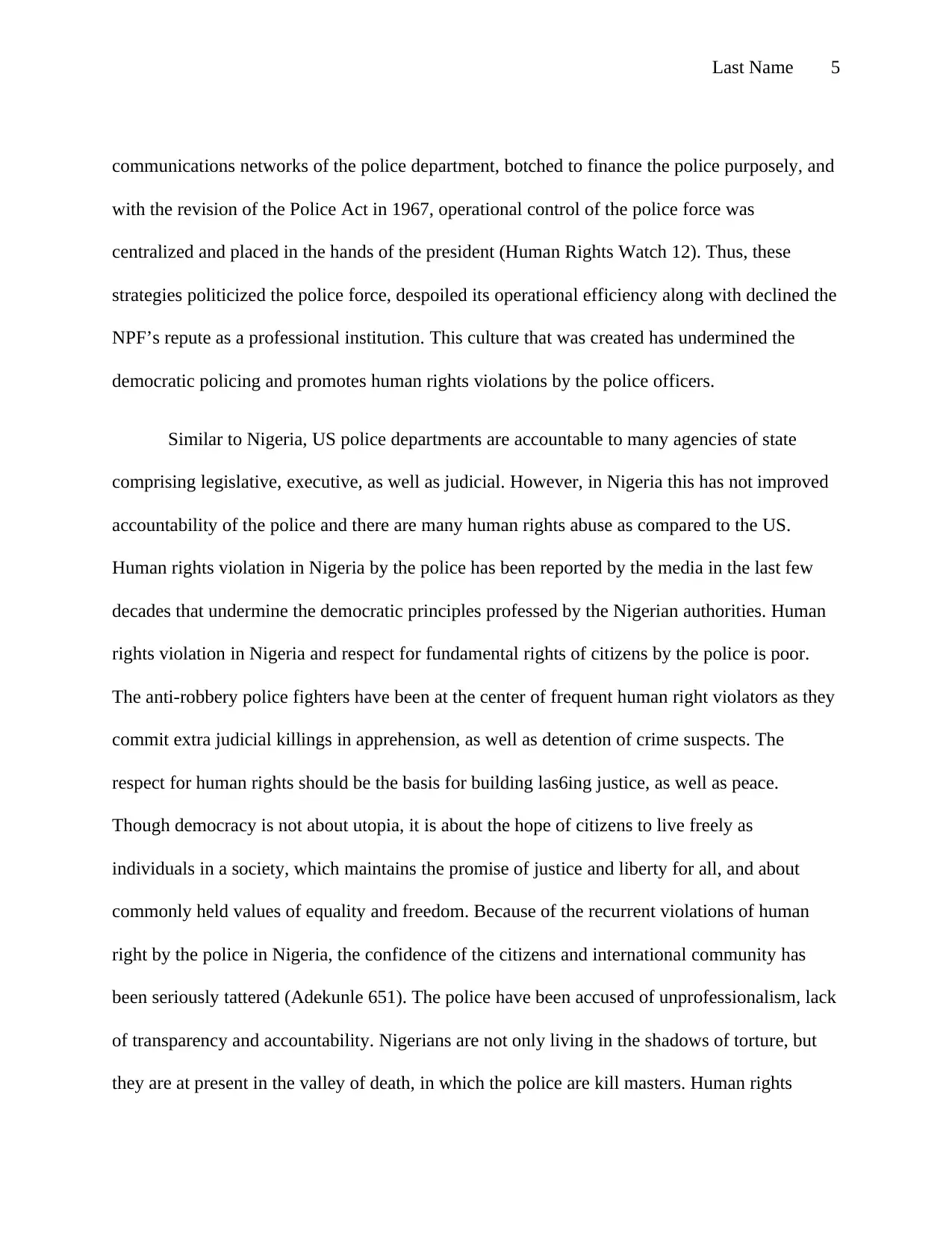
Last Name 5
communications networks of the police department, botched to finance the police purposely, and
with the revision of the Police Act in 1967, operational control of the police force was
centralized and placed in the hands of the president (Human Rights Watch 12). Thus, these
strategies politicized the police force, despoiled its operational efficiency along with declined the
NPF’s repute as a professional institution. This culture that was created has undermined the
democratic policing and promotes human rights violations by the police officers.
Similar to Nigeria, US police departments are accountable to many agencies of state
comprising legislative, executive, as well as judicial. However, in Nigeria this has not improved
accountability of the police and there are many human rights abuse as compared to the US.
Human rights violation in Nigeria by the police has been reported by the media in the last few
decades that undermine the democratic principles professed by the Nigerian authorities. Human
rights violation in Nigeria and respect for fundamental rights of citizens by the police is poor.
The anti-robbery police fighters have been at the center of frequent human right violators as they
commit extra judicial killings in apprehension, as well as detention of crime suspects. The
respect for human rights should be the basis for building las6ing justice, as well as peace.
Though democracy is not about utopia, it is about the hope of citizens to live freely as
individuals in a society, which maintains the promise of justice and liberty for all, and about
commonly held values of equality and freedom. Because of the recurrent violations of human
right by the police in Nigeria, the confidence of the citizens and international community has
been seriously tattered (Adekunle 651). The police have been accused of unprofessionalism, lack
of transparency and accountability. Nigerians are not only living in the shadows of torture, but
they are at present in the valley of death, in which the police are kill masters. Human rights
communications networks of the police department, botched to finance the police purposely, and
with the revision of the Police Act in 1967, operational control of the police force was
centralized and placed in the hands of the president (Human Rights Watch 12). Thus, these
strategies politicized the police force, despoiled its operational efficiency along with declined the
NPF’s repute as a professional institution. This culture that was created has undermined the
democratic policing and promotes human rights violations by the police officers.
Similar to Nigeria, US police departments are accountable to many agencies of state
comprising legislative, executive, as well as judicial. However, in Nigeria this has not improved
accountability of the police and there are many human rights abuse as compared to the US.
Human rights violation in Nigeria by the police has been reported by the media in the last few
decades that undermine the democratic principles professed by the Nigerian authorities. Human
rights violation in Nigeria and respect for fundamental rights of citizens by the police is poor.
The anti-robbery police fighters have been at the center of frequent human right violators as they
commit extra judicial killings in apprehension, as well as detention of crime suspects. The
respect for human rights should be the basis for building las6ing justice, as well as peace.
Though democracy is not about utopia, it is about the hope of citizens to live freely as
individuals in a society, which maintains the promise of justice and liberty for all, and about
commonly held values of equality and freedom. Because of the recurrent violations of human
right by the police in Nigeria, the confidence of the citizens and international community has
been seriously tattered (Adekunle 651). The police have been accused of unprofessionalism, lack
of transparency and accountability. Nigerians are not only living in the shadows of torture, but
they are at present in the valley of death, in which the police are kill masters. Human rights
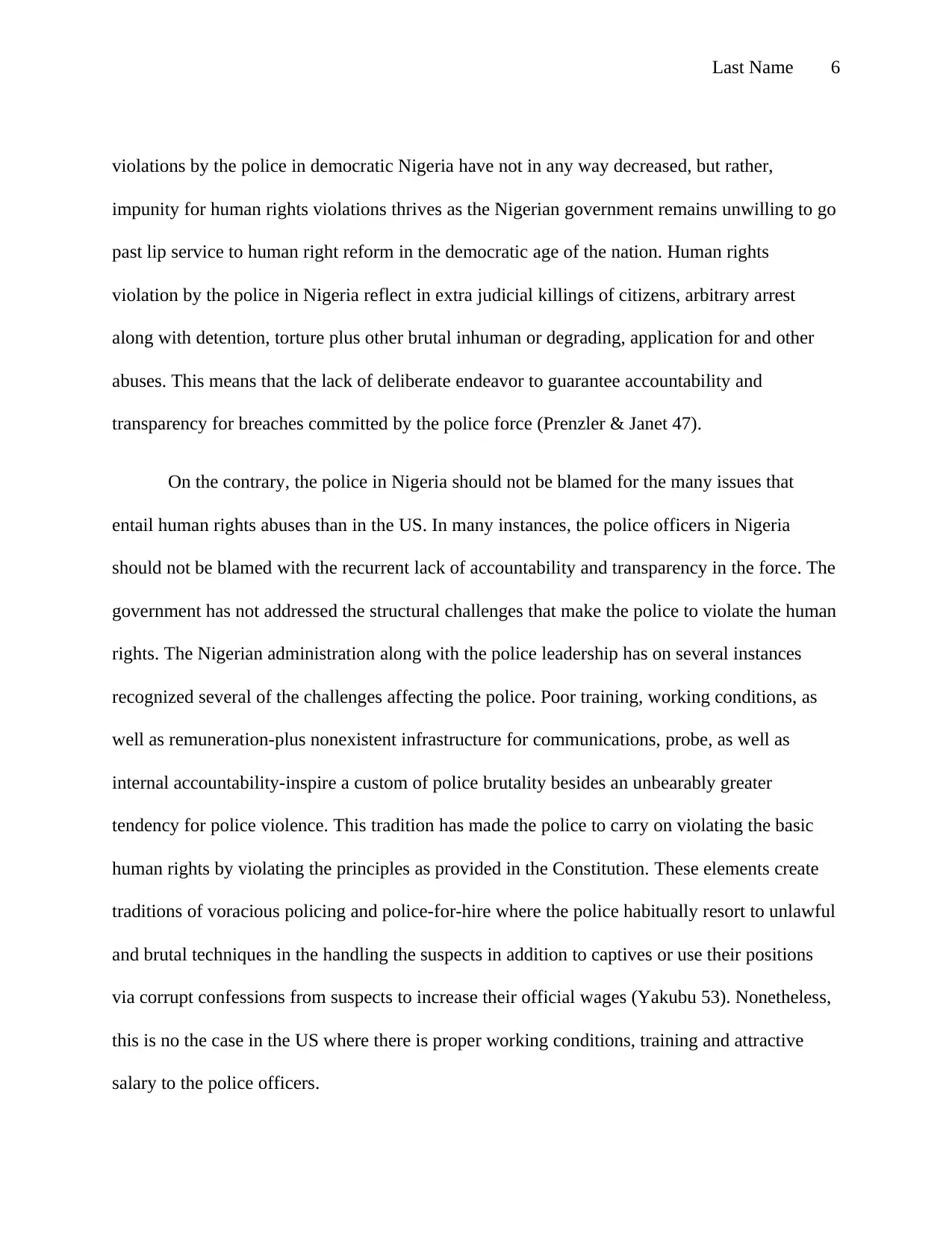
Last Name 6
violations by the police in democratic Nigeria have not in any way decreased, but rather,
impunity for human rights violations thrives as the Nigerian government remains unwilling to go
past lip service to human right reform in the democratic age of the nation. Human rights
violation by the police in Nigeria reflect in extra judicial killings of citizens, arbitrary arrest
along with detention, torture plus other brutal inhuman or degrading, application for and other
abuses. This means that the lack of deliberate endeavor to guarantee accountability and
transparency for breaches committed by the police force (Prenzler & Janet 47).
On the contrary, the police in Nigeria should not be blamed for the many issues that
entail human rights abuses than in the US. In many instances, the police officers in Nigeria
should not be blamed with the recurrent lack of accountability and transparency in the force. The
government has not addressed the structural challenges that make the police to violate the human
rights. The Nigerian administration along with the police leadership has on several instances
recognized several of the challenges affecting the police. Poor training, working conditions, as
well as remuneration-plus nonexistent infrastructure for communications, probe, as well as
internal accountability-inspire a custom of police brutality besides an unbearably greater
tendency for police violence. This tradition has made the police to carry on violating the basic
human rights by violating the principles as provided in the Constitution. These elements create
traditions of voracious policing and police-for-hire where the police habitually resort to unlawful
and brutal techniques in the handling the suspects in addition to captives or use their positions
via corrupt confessions from suspects to increase their official wages (Yakubu 53). Nonetheless,
this is no the case in the US where there is proper working conditions, training and attractive
salary to the police officers.
violations by the police in democratic Nigeria have not in any way decreased, but rather,
impunity for human rights violations thrives as the Nigerian government remains unwilling to go
past lip service to human right reform in the democratic age of the nation. Human rights
violation by the police in Nigeria reflect in extra judicial killings of citizens, arbitrary arrest
along with detention, torture plus other brutal inhuman or degrading, application for and other
abuses. This means that the lack of deliberate endeavor to guarantee accountability and
transparency for breaches committed by the police force (Prenzler & Janet 47).
On the contrary, the police in Nigeria should not be blamed for the many issues that
entail human rights abuses than in the US. In many instances, the police officers in Nigeria
should not be blamed with the recurrent lack of accountability and transparency in the force. The
government has not addressed the structural challenges that make the police to violate the human
rights. The Nigerian administration along with the police leadership has on several instances
recognized several of the challenges affecting the police. Poor training, working conditions, as
well as remuneration-plus nonexistent infrastructure for communications, probe, as well as
internal accountability-inspire a custom of police brutality besides an unbearably greater
tendency for police violence. This tradition has made the police to carry on violating the basic
human rights by violating the principles as provided in the Constitution. These elements create
traditions of voracious policing and police-for-hire where the police habitually resort to unlawful
and brutal techniques in the handling the suspects in addition to captives or use their positions
via corrupt confessions from suspects to increase their official wages (Yakubu 53). Nonetheless,
this is no the case in the US where there is proper working conditions, training and attractive
salary to the police officers.
⊘ This is a preview!⊘
Do you want full access?
Subscribe today to unlock all pages.

Trusted by 1+ million students worldwide
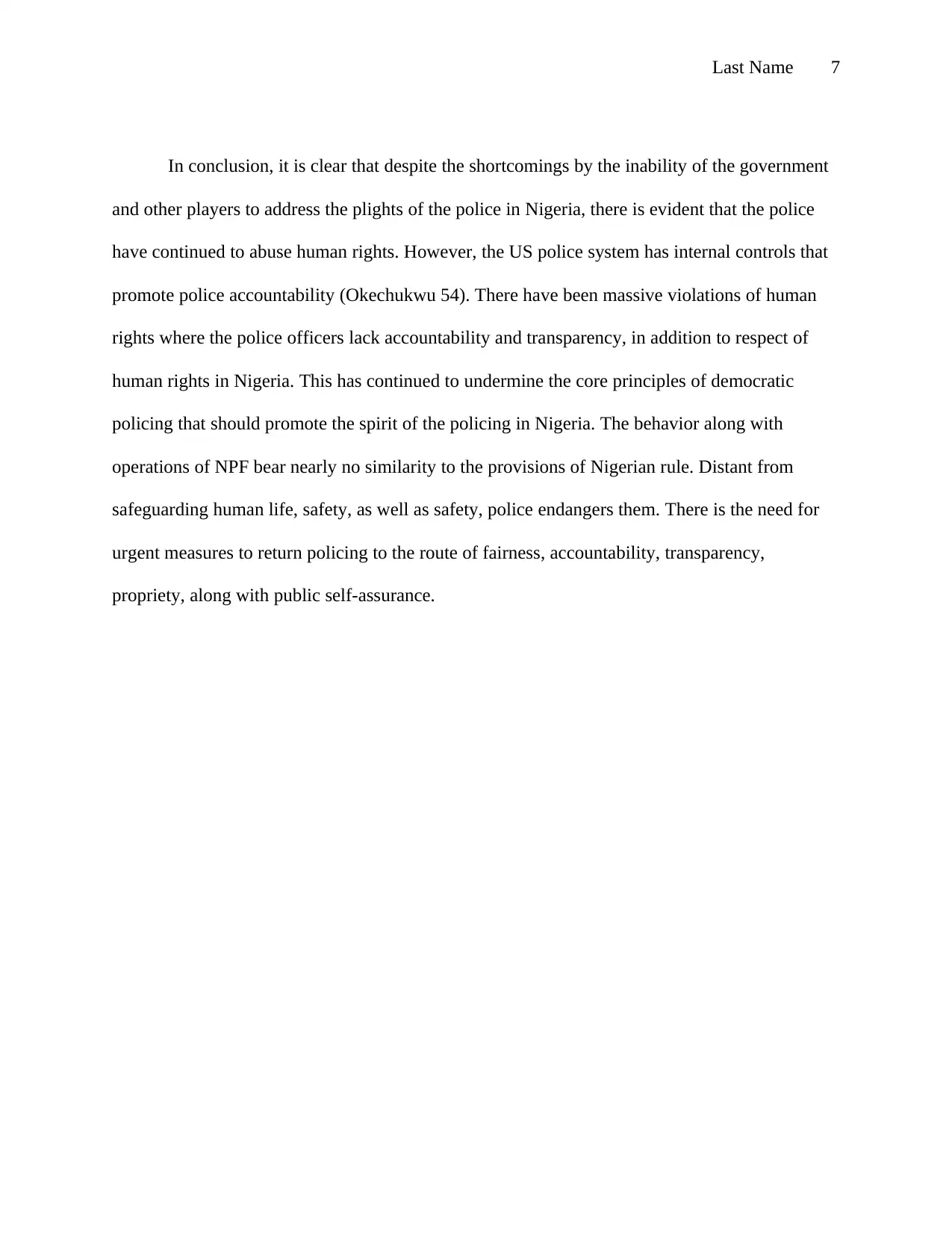
Last Name 7
In conclusion, it is clear that despite the shortcomings by the inability of the government
and other players to address the plights of the police in Nigeria, there is evident that the police
have continued to abuse human rights. However, the US police system has internal controls that
promote police accountability (Okechukwu 54). There have been massive violations of human
rights where the police officers lack accountability and transparency, in addition to respect of
human rights in Nigeria. This has continued to undermine the core principles of democratic
policing that should promote the spirit of the policing in Nigeria. The behavior along with
operations of NPF bear nearly no similarity to the provisions of Nigerian rule. Distant from
safeguarding human life, safety, as well as safety, police endangers them. There is the need for
urgent measures to return policing to the route of fairness, accountability, transparency,
propriety, along with public self-assurance.
In conclusion, it is clear that despite the shortcomings by the inability of the government
and other players to address the plights of the police in Nigeria, there is evident that the police
have continued to abuse human rights. However, the US police system has internal controls that
promote police accountability (Okechukwu 54). There have been massive violations of human
rights where the police officers lack accountability and transparency, in addition to respect of
human rights in Nigeria. This has continued to undermine the core principles of democratic
policing that should promote the spirit of the policing in Nigeria. The behavior along with
operations of NPF bear nearly no similarity to the provisions of Nigerian rule. Distant from
safeguarding human life, safety, as well as safety, police endangers them. There is the need for
urgent measures to return policing to the route of fairness, accountability, transparency,
propriety, along with public self-assurance.
Paraphrase This Document
Need a fresh take? Get an instant paraphrase of this document with our AI Paraphraser
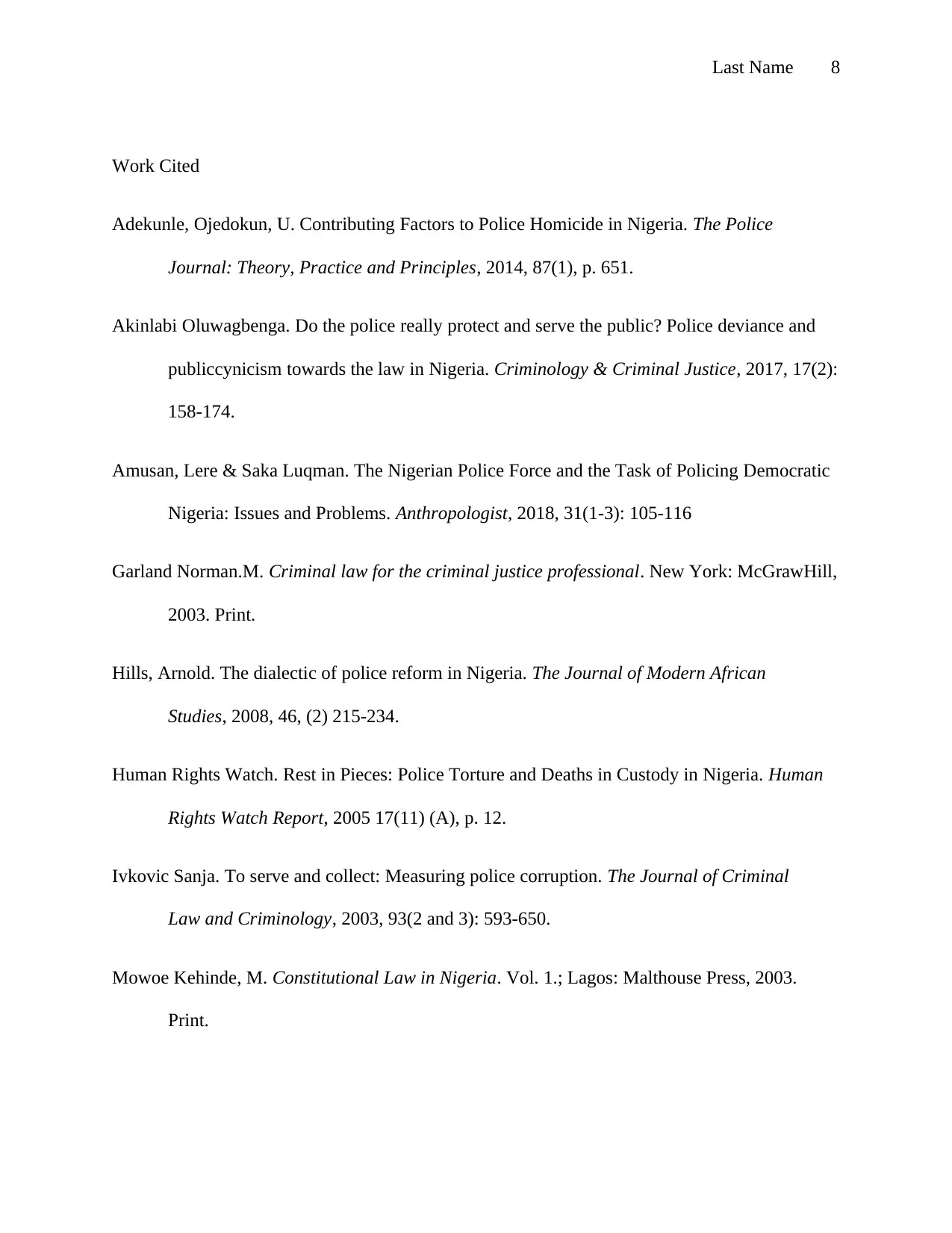
Last Name 8
Work Cited
Adekunle, Ojedokun, U. Contributing Factors to Police Homicide in Nigeria. The Police
Journal: Theory, Practice and Principles, 2014, 87(1), p. 651.
Akinlabi Oluwagbenga. Do the police really protect and serve the public? Police deviance and
publiccynicism towards the law in Nigeria. Criminology & Criminal Justice, 2017, 17(2):
158-174.
Amusan, Lere & Saka Luqman. The Nigerian Police Force and the Task of Policing Democratic
Nigeria: Issues and Problems. Anthropologist, 2018, 31(1-3): 105-116
Garland Norman.M. Criminal law for the criminal justice professional. New York: McGrawHill,
2003. Print.
Hills, Arnold. The dialectic of police reform in Nigeria. The Journal of Modern African
Studies, 2008, 46, (2) 215-234.
Human Rights Watch. Rest in Pieces: Police Torture and Deaths in Custody in Nigeria. Human
Rights Watch Report, 2005 17(11) (A), p. 12.
Ivkovic Sanja. To serve and collect: Measuring police corruption. The Journal of Criminal
Law and Criminology, 2003, 93(2 and 3): 593-650.
Mowoe Kehinde, M. Constitutional Law in Nigeria. Vol. 1.; Lagos: Malthouse Press, 2003.
Print.
Work Cited
Adekunle, Ojedokun, U. Contributing Factors to Police Homicide in Nigeria. The Police
Journal: Theory, Practice and Principles, 2014, 87(1), p. 651.
Akinlabi Oluwagbenga. Do the police really protect and serve the public? Police deviance and
publiccynicism towards the law in Nigeria. Criminology & Criminal Justice, 2017, 17(2):
158-174.
Amusan, Lere & Saka Luqman. The Nigerian Police Force and the Task of Policing Democratic
Nigeria: Issues and Problems. Anthropologist, 2018, 31(1-3): 105-116
Garland Norman.M. Criminal law for the criminal justice professional. New York: McGrawHill,
2003. Print.
Hills, Arnold. The dialectic of police reform in Nigeria. The Journal of Modern African
Studies, 2008, 46, (2) 215-234.
Human Rights Watch. Rest in Pieces: Police Torture and Deaths in Custody in Nigeria. Human
Rights Watch Report, 2005 17(11) (A), p. 12.
Ivkovic Sanja. To serve and collect: Measuring police corruption. The Journal of Criminal
Law and Criminology, 2003, 93(2 and 3): 593-650.
Mowoe Kehinde, M. Constitutional Law in Nigeria. Vol. 1.; Lagos: Malthouse Press, 2003.
Print.
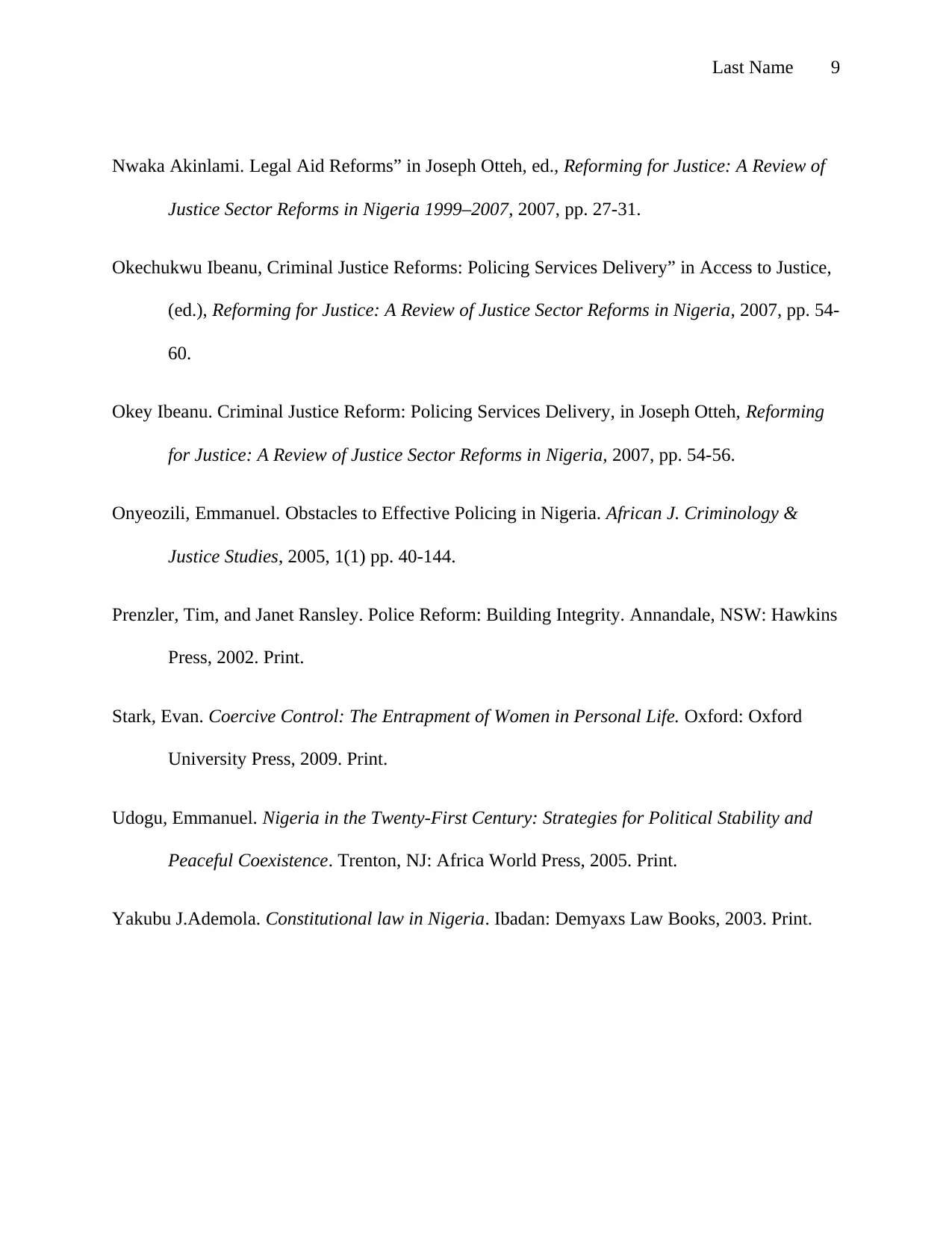
Last Name 9
Nwaka Akinlami. Legal Aid Reforms” in Joseph Otteh, ed., Reforming for Justice: A Review of
Justice Sector Reforms in Nigeria 1999–2007, 2007, pp. 27-31.
Okechukwu Ibeanu, Criminal Justice Reforms: Policing Services Delivery” in Access to Justice,
(ed.), Reforming for Justice: A Review of Justice Sector Reforms in Nigeria, 2007, pp. 54-
60.
Okey Ibeanu. Criminal Justice Reform: Policing Services Delivery, in Joseph Otteh, Reforming
for Justice: A Review of Justice Sector Reforms in Nigeria, 2007, pp. 54-56.
Onyeozili, Emmanuel. Obstacles to Effective Policing in Nigeria. African J. Criminology &
Justice Studies, 2005, 1(1) pp. 40-144.
Prenzler, Tim, and Janet Ransley. Police Reform: Building Integrity. Annandale, NSW: Hawkins
Press, 2002. Print.
Stark, Evan. Coercive Control: The Entrapment of Women in Personal Life. Oxford: Oxford
University Press, 2009. Print.
Udogu, Emmanuel. Nigeria in the Twenty-First Century: Strategies for Political Stability and
Peaceful Coexistence. Trenton, NJ: Africa World Press, 2005. Print.
Yakubu J.Ademola. Constitutional law in Nigeria. Ibadan: Demyaxs Law Books, 2003. Print.
Nwaka Akinlami. Legal Aid Reforms” in Joseph Otteh, ed., Reforming for Justice: A Review of
Justice Sector Reforms in Nigeria 1999–2007, 2007, pp. 27-31.
Okechukwu Ibeanu, Criminal Justice Reforms: Policing Services Delivery” in Access to Justice,
(ed.), Reforming for Justice: A Review of Justice Sector Reforms in Nigeria, 2007, pp. 54-
60.
Okey Ibeanu. Criminal Justice Reform: Policing Services Delivery, in Joseph Otteh, Reforming
for Justice: A Review of Justice Sector Reforms in Nigeria, 2007, pp. 54-56.
Onyeozili, Emmanuel. Obstacles to Effective Policing in Nigeria. African J. Criminology &
Justice Studies, 2005, 1(1) pp. 40-144.
Prenzler, Tim, and Janet Ransley. Police Reform: Building Integrity. Annandale, NSW: Hawkins
Press, 2002. Print.
Stark, Evan. Coercive Control: The Entrapment of Women in Personal Life. Oxford: Oxford
University Press, 2009. Print.
Udogu, Emmanuel. Nigeria in the Twenty-First Century: Strategies for Political Stability and
Peaceful Coexistence. Trenton, NJ: Africa World Press, 2005. Print.
Yakubu J.Ademola. Constitutional law in Nigeria. Ibadan: Demyaxs Law Books, 2003. Print.
⊘ This is a preview!⊘
Do you want full access?
Subscribe today to unlock all pages.

Trusted by 1+ million students worldwide
1 out of 9
Your All-in-One AI-Powered Toolkit for Academic Success.
+13062052269
info@desklib.com
Available 24*7 on WhatsApp / Email
![[object Object]](/_next/static/media/star-bottom.7253800d.svg)
Unlock your academic potential
Copyright © 2020–2026 A2Z Services. All Rights Reserved. Developed and managed by ZUCOL.
